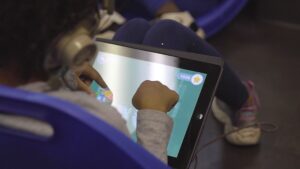
Students can now forget about TikTok and begin to use their time in class more productively. Florida House Bill 379, which took effect July 1, essentially bans students from accessing social media in public schools unless expressly directed to do so by a teacher for educational purposes. The bill also requires the Florida Department of Education to publish a social media awareness curriculum for all public schools.
In recent years, the proliferation of social media platforms has raised growing concerns about their use in schools. While social media can offer benefits like improved communication and access to information, its impact on students’ well-being, academic performance, and privacy cannot be ignored.
One of the primary concerns surrounding social media use in schools is its potential to distract students. The constant notifications, messages and updates can divert students’ attention away from classwork and assignments. This distraction not only hinders their ability to focus but also affects their academic performance. Research has shown that excessive social media use is linked to lower grades and reduced productivity among students.
Carmen Conner, principal at Pineview Elementary School, spoke about how teachers are monitoring students on district-issued devices. “We have something on all teacher computers in Leon County Schools called GoGuardian. GoGuardian is software that allows you to see if I were teaching in a classroom of 25, I can have all 25 screens on my screen and I can watch what they’re doing. So it’s careful monitoring,” she said.
Madeyln Nichelson, a fourth grade instructor at Florida State University Schools, commonly known as Florida High, believes technology is useful for students but also made a case for better regulation. Nichelson mentioned that instructors at Florida High also use monitoring software similar to GoGuardian called Senso, which allows instructors to monitor students’ screens during class. “We have full control. We can open and close tabs, as well as send direct messages to students.”
Nichelson also noted that instructors have the ability to use social media to their own discretion. “It can improve students’ learning but it’s solely up to the teachers to decide how to use it,” she said.
Privacy is another pressing issue. Many students are unaware of the risks associated with sharing personal information online. They may unknowingly expose themselves to potential harm to themselves as well as their educational institution. Schools must educate students about the importance of safeguarding their privacy and the potential consequences of oversharing on social media.
The Leon County School District has acknowledged the benefits as well as concerns of social platforms in school. HB 379 remains fairly new but instructors and administration recognize its purpose. Technology will continue to advance and HB 379 stands as the pioneer of bills against social influence. Educational advancement has entered an age of technological regulation.
Will it work? All we know is you’ll have to tweet about it … after class.